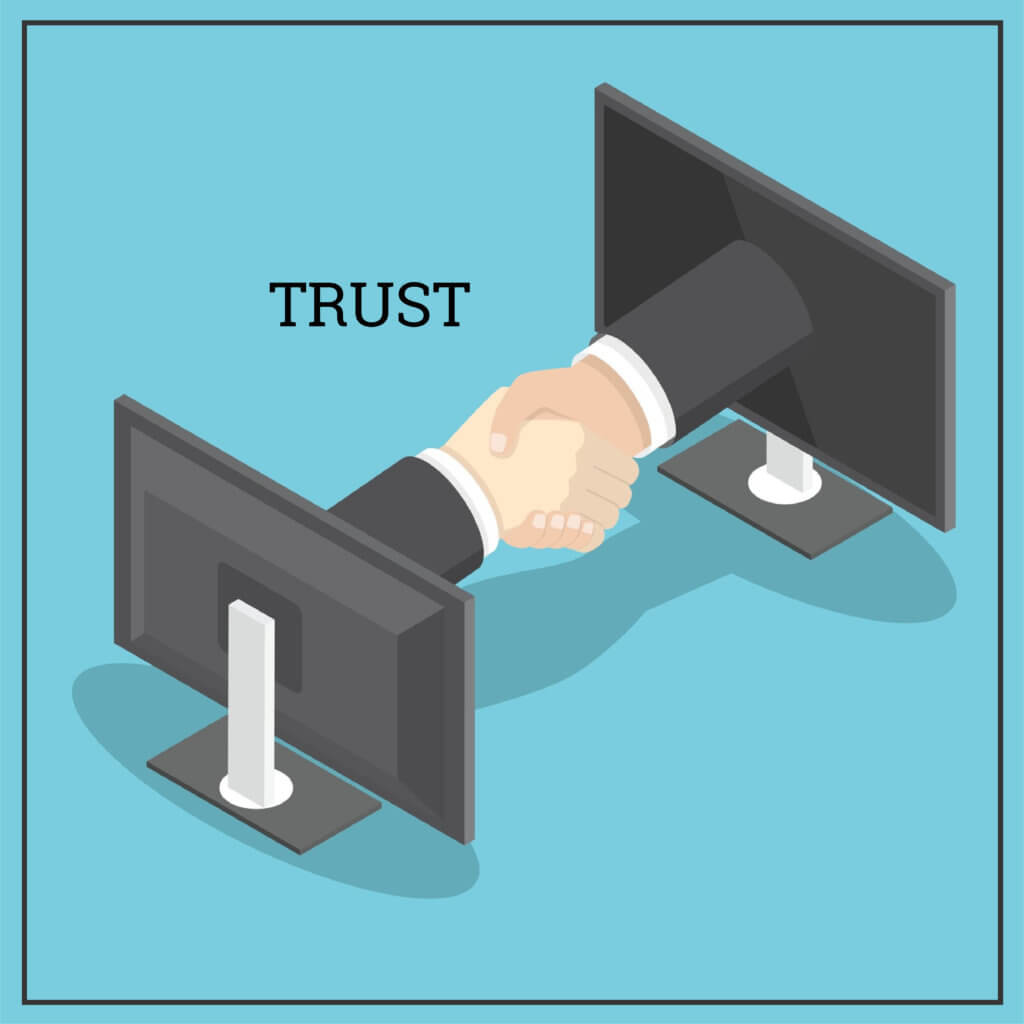Building Trust With Your Remote Team

Whether working remotely is the norm for your team, or it’s suddenly been forced upon you thanks to Covid-19, trust is the absolutely crucial!
Building trust is the foundation of a highly productive team, yet cultivating trust with remote workers is more complicated. Working virtually doesn’t allow you to casually bond at the water cooler or catch up in the break room like you would if you were all working under one roof.
Working remotely has a way of amplifying issues – issues that erode trust and negatively impact the team. That means that that the entire team must be intentional about engaging in activities that cultivate trust. Of course, the burden for building trust lies with the leader, however, team members are also responsible for building trust with each other. After all, you don’t want problems; you want high levels of trust on your team because trust translates into a variety of positives!
So how can you build trust with your remote team? Here are some effective ways of filling up your people’s “trust tanks”:
1. Meticulous Communication
Sloppy communication diminishes trust and distance created by working remotely demands that you and your team communicate meticulously! That includes habits like…
- Regularly asking for clarification – watch out for your assumptions
- Immediately addressing issues
- Setting clear expectations and feedback – the two go hand in hand
- Follow-up; check in!
- Summarize meetings – make sure everyone knows who is responsible for what
- Communicate your confidence in your people
- Relate what’s happening with the organization – no one likes to be in the dark
- Clearly communicate your availability – share calendars, notify your team of your availability, etc.
Communication voids breed negativity!
2. Masterful Meetings
Regular meetings are necessary, especially when working remotely! In order to develop trust, you must arrive on time, be prepared and present, and keep the meeting on track. Keep the meeting within the time stated. No one will complain if the meeting ends early! Recording the meetings and sending out meeting minutes to document any action steps that were agreed upon afterwards can also be helpful. Invite collaboration. Consider taking turns with how facilitate your virtual meetings.
Don’t forget to schedule regular check-ins with the individuals on your team to build rapport, address issues, celebrate successes, set expectations, give feedback, and follow-up!
Periodically conduct “wellness” check-ups with the whole team to see how the team feels they are working together.
3. Leverage Technology
Remote workers are dependent on technology, but there may be more ways to incorporate technology. Connecting frequently with the team is essential. It doesn’t always have to be via video, although video is nice. You can also connect using technology like…
- Slack
- Google Hangouts
- Chanty
- Fuze
- Glip
- Let’s Chat (Free!)
- Rocket Chat (Free!)
- Azendoo
- Bitirx24 (with CRM)
- Skype
There are others, and many of the above options have project management, CRMs, and other tools that might benefit your team!
You may also explore some options that allow you to share documents, automate project management, or work flow like…
If technology isn’t your strength, why not allow your team to work together to choose technology options that will meet your teams needs!
4. Deliberately Bond
Relationships are at the heart of trust. Cultivating relationships virtually takes creativity and being deliberate – it won’t just happen. Here are some ideas to help you facilitate connection:
- Create informal virtual hangout times.
- Assign mentors.
- Have the team answer a “get-to-know-you question” weekly. For example, what’s your favorite dessert? Movie? Game?
- Take a personality assessment together like DISC to identify the ways you are similar, as well as the ways you are unique different.
- Provide a way to chat using one of the “technology” tools mentioned above.
- Model transparency and vulnerability.
- Create safety for you team.
- Grow together! Offer opportunities to develop professionally as well as personally. Discuss self-improvement topics together – topics like resolving conflict, communication, or developing solid habits.
- Have a process in place for nurturing relationships right from the start when on-boarding a new team member.
5. Lead Well!
Leading remotely takes skill! It may tempt you to micromanage, but micromanaging is the enemy of trust! Express your confidence in your team – don’t keep them guessing! Be flexible. Focus on output, not hours on the job. The most important question: Are your people successfully delivering?
And if you want to get the most out of your team, tap into their talents! Encourage them to work in their areas of strength. Give them meaningful work to do.
Give your people a voice! Invite them to collaborate. An engaged team is not only more productive but also a team where trust resides.
Support your people! Demonstrate that you are there for them. Provide them with the resources they need including office supplies, equipment, relevant information, coaching when needed, and more.
The bottom line, trust equals money whether you work remotely or you are all in the office together!
How are you building trust with your remote workers?
© Can Stock Photo / ojogabonitoo

